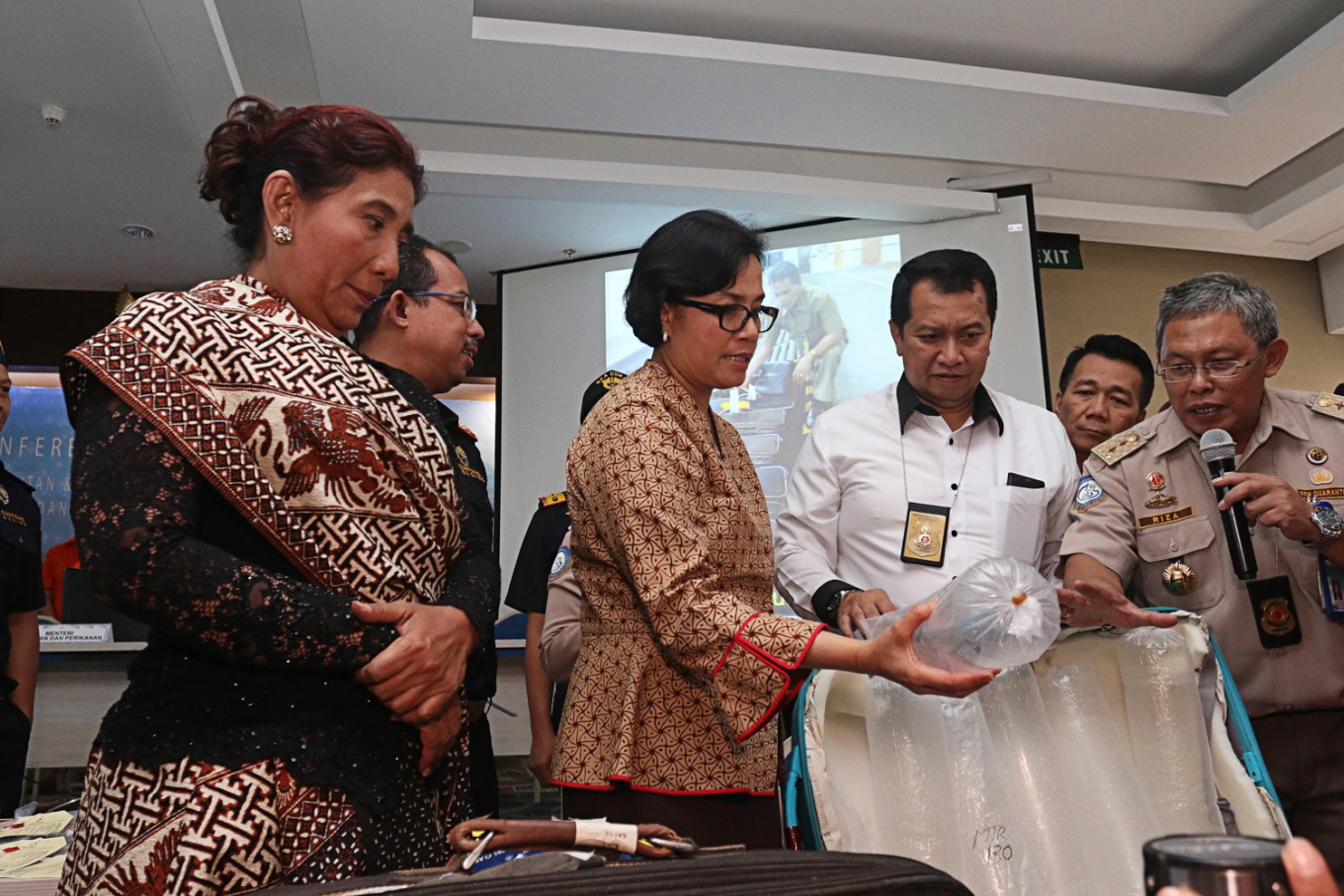Susi urges protection of Indonesian seamen in Japan
Change Size
 Tough measures – Maritime Affairs and Fisheries Minister Susi Pudjiastuti (left), together with Finance Minister Sri Mulyani Indrawati (second from left) and Brig.Gen.Purwadi (second from right), head of special crime unit at the National Police’s Criminal Investigation Division (Bareskrim), observe lobster seeds confiscated in a string of operations during a press conference in Jakarta on Oct.26. (Antara/Rivan Awal Lingga)
Tough measures – Maritime Affairs and Fisheries Minister Susi Pudjiastuti (left), together with Finance Minister Sri Mulyani Indrawati (second from left) and Brig.Gen.Purwadi (second from right), head of special crime unit at the National Police’s Criminal Investigation Division (Bareskrim), observe lobster seeds confiscated in a string of operations during a press conference in Jakarta on Oct.26. (Antara/Rivan Awal Lingga)
U
pon realizing that thousands of Indonesian seamen ply their trade aboard Japanese fishing vessels, Maritime Affairs and Fisheries Minister Susi Pudjiastuti urged the Japanese fisheries industry to prevent any human trafficking practices from materializing.
Susi was in Japan on a five-day working visit to deepen maritime and fisheries cooperation as a follow-up to the pledges that Japanese Prime Minister Shinzo Abe made during his state visit to Indonesia earlier this year.
She is also slated to meet with Japan's minister for agriculture, forestry and fisheries and defense minister, among others.
On her second night in Tokyo, Susi talked shop with the president of the Japan Tuna Fisheries Cooperative Association, Jun Yamashita. During a dinner hosted by the Japanese businessman, Susi was informed there were around 3,000 Indonesian seamen working on board vessels owned by the association.
"As many as 3,000 of our crewmen are from Indonesia. Without their help, we wouldn’t be able to catch any tuna," Yamashita said, as quoted in a press release distributed by the ministry on Thursday.
Susi thanked the association’s president for taking care of the Indonesian crewmen who work aboard vessels that go out as far as the Indian, Pacific and even Atlantic oceans.
"But if I hear any mention of traffickers, I won't hesitate to chase them to the ends of the earth," Susi said in the statement.
The minister, who is renowned for her frankness and candid remarks, asked Yamashita for regular updates on the 1,200 Indonesian seamen registered with businesses under the association, so that the government would be able to protect them and ensure their rights are upheld.
Japan is one of the largest consumers of tuna in the world with an annual demand of 308,000 tons, which is part of the reason there are so many tuna fishing vessels in operation.
(Read also: Minister Susi to visit Japan to offer investment opportunities)
Earlier that day, Susi visited a number of businesses to seek insight and expertise that may benefit the Indonesian fisheries industry, including Misaki Tuna Fish Landing Market in Kanagawa prefecture, an auction house integrated with a seafood restaurant and a supermarket.
She also visited Japan Super Freeze Co. Ltd., the largest fisheries cold storage house in Japan and the only one in the world to use liquefied natural gas (LNG), which is an environmentally friendly alternative to electricity.
"We use LNG because electricity costs are very high," said JSF president Shigeru Hamada.
JSF's cold storage warehouse, he said, can preserve produce in -60 degrees Celsius refrigerators.
At the moment, the Maritime Affairs and Fisheries Ministry can only preserve products at a temperature of -20 degrees Celsius.
According to JSF, there is enough cold storage for the company to hold 11,000 tons of tuna from various countries, with the majority of produce originating from Taiwan.
Susi said Indonesia has the potential to develop LNG-powered cold storage systems like that in Japan, considering there are still regions with abundant natural gas resources.
She did however note the steep entry point for the development of such cold storage solutions, with initial investment requirements reaching US$300 million. For that, she urged both local and foreign investors to look into putting money into the building of such facilities.
Indonesia is estimated to have some 100 trillion standard cubic feet of proven gas reserves, including LNG. But the country is in danger of experiencing a shortage of 500 million standard cubic feet per day of gas starting in 2019, owing to soaring demand and poor infrastructure.
Pertamina estimates that around $70 billion to $80 billion in funds is needed to develop gas infrastructure until 2030.









